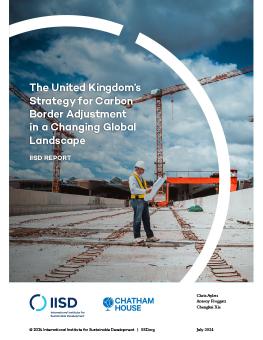
The United Kingdom's Strategy for Carbon Border Adjustment in a Changing Global Landscape
This report examines the proposed United Kingdom Carbon Border Adjustment Mechanism in the context of the European Union's CBAM and the United Kingdom's relationship with trading partners. It assesses impacts on industries and stakeholders, incorporating insights from extensive consultations. It addresses implementation challenges, including impacts on exports, economic activity, and employment, and it emphasizes balancing climate action with equity through international collaboration.
-
Sectors covered by carbon pricing in the UK could face competition from jurisdictions with less stringent policies: a phenomenon known as carbon leakage. The proposed UK Carbon Border Adjustment Mechanism (CBAM) could contribute to preventing such carbon leakage.
-
The proposed UK CBAM diverges from the EU CBAM in at least two important ways: the sectoral coverage (it includes glass and ceramics but does not include electricity) and the implementation timeline which does not provide for any transitional period.
-
The UK government intends to apply its proposed CBAM to all countries equally, regardless of their development status, similarly to the EU CBAM. This might create additional challenges to developing countries and LDCs given their limited capacities to measure and report emissions from their industries and associated supply chains.
This country report is based on background research by IISD and the Royal Institute of International Affairs – Chatham House to assess the proposed United Kingdom Carbon Border Adjustment Mechanism (CBAM) from design to implementation to its potential impact on trading partners, including on developing and least developed countries (LDCs). The research is supplemented by detailed discussion in two dialogues organized within the country. The two dialogues heard the views and perspectives of national stakeholders from the government, industry, think tanks and academics, civil society, finance providers, labour, and international stakeholders. While acknowledging the need of CBAMs/border carbon adjustment schemes to reach the Paris Agreement goals, these views and perspectives also outline the challenges. These challenges include
- potential implementation difficulties, particularly because the UK CBAM does not envisage any transition period;
- potential impacts on trade and trading partners; and
- the need to consider the special situation of smaller developing countries and LDCs.
The report's conclusions include the critical importance of identifying potential implementation challenges as well as aligning it, as best as possible, with the EU CBAM to its smooth implementation and to avoid creating multiple administrative and bureaucratic requirements for the trading partners.
You might also be interested in
Border Carbon Adjustments: Pivotal design choices for policy-makers
This policy brief covers the pivotal choices in the design of border carbon adjustments, aiming to provide useful insights to policy-makers and set the ground for the broader discussions about the best practices.
Border Carbon Adjustments: Priorities for international cooperation
This IISD policy brief looks into border carbon adjustment design elements that are priorities for international cooperation, as well as the possible venues, formats, and shapes that such a discussion might take.
Border Carbon Adjustment Mechanisms and Impacts on Vietnam
This report consolidates, analyzes, and presents views and perspectives of stakeholders from Vietnam on border carbon adjustment (BCA) schemes to contribute to the global debate on BCA good practices.
Border Carbon Adjustments: Trinidad and Tobago country report
This report consolidates, analyzes, and presents views and perspectives of stakeholders from Trinidad and Tobago on border carbon adjustment (BCA) schemes to contribute to the global debate on BCA good practices.